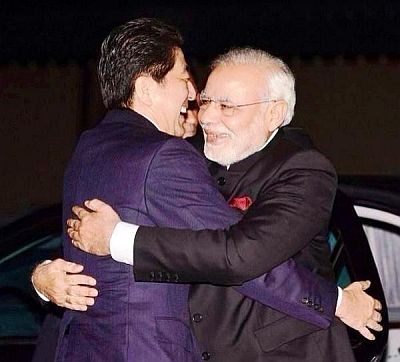 'The regional context and the personal ties between Narendra Modi and Shinzo Abe to a large extent contributed to the dawn of a new era in bilateral relations,' says Srikanth Kondapalli.
'The regional context and the personal ties between Narendra Modi and Shinzo Abe to a large extent contributed to the dawn of a new era in bilateral relations,' says Srikanth Kondapalli.
Prime Minister Narendra Modi's visit to Tokyo will go down in history for opening up a 'special partnership' chapter in bilateral relations. While for nearly a decade, both sides have intensified discussion on a strategic partnership, the regional context and the personal ties between Modi and Japanese Prime Minister Shinzo Abe to a large extent contributed to this 'dawn of a new era' in bilateral relations.
Firstly, the superlatives used by both leaders at Tokyo suggest to injecting new enthusiasm in bilateral relations at the national, regional and global levels. For instance, both in the joint declaration and at the press interaction, Modi stated that 'No country has done more for modernising India's infrastructure than Japan.' He suggested that Japan is the 'closest and most reliable partner' for India and that 'No relationship in India commands the level of public consensus as our relations with Japan does.' He also stated that relations with Japan are his 'highest priority.'
Secondly, as if to acknowledge Abe's speech to the Indian Parliament in August 2007 on the 'arc of freedom and prosperity', the joint declaration of the two PMs announced strengthening democracy and 'shape the course of their countries and the character of this region and the world in this century.'
While we have to see the ground level cooperation between the two in promoting democracy at the Asian regional and global levels, this is the first time that India has come out of its South Asian neighbourhood in terms of this political initiative. Modi stated that Japan is a 'vital partner for India's transformation,' but also for the 'two peace-loving and democratic' countries playing 'an influential role in shaping the future of Asia and the world.'
Thirdly, to provide teeth to the above, both decided to upgrade defence and maritime cooperation. While no specifics in regard to this cooperation are available including on the proposed US-2 amphibian aircraft transfer to India, against the backdrop of Finance Minister Arun Jaitley's announcement recently of increasing FDI in defence production and the Japan cabinet clearing the export of arms, it is expected that dual use technologies could be co-produced in India in coming years.
Related to this subject is the declaration that both shared commitment to 'maritime security, freedom of navigation and overflight of civil aviation safety, unimpeded lawful commerce, and peaceful settlement of disputes in accordance with international law.'
In the light of the recent contest over the air identification zone and incorporation of disputed islands in the ambit of the territorial sea in the East and South China Sea, the above declaration provides opportunities for India and Japan to work together in coming years. Both declared that their cooperation will be viewed as 'a force of peace, stability and prosperity in Asia and the world.' Clearly, the India-Japan ambit is increasing.
Fourthly, as if to nudge the P-5 countries for further action, India and Japan declared that intensify cooperation in the United Nations reform and restructuring. The earlier bid by the G-4 (including India, Japan, Germany and Brazil) faced opposition from regional powers and China. In addition, as global commons, viz., maritime, cyber and space have come under stress recently, India and Japan declared that they would cooperate on these issues.
Fifthly, one of the major takeaways from this visit is in the economic field. While the much debated civil nuclear agreement and US-2 amphibian aircraft sale have to wait for further negotiations between the two officials, the high-speed railways, infrastructure projects and manufacturing sector have received much attention during this visit.
The Japanese prime minister has committed $35 billion in public and private investment and financing for the next five years. The total Japanese investment in India so far is about $12 billion (as compared to nearly $300 billion in China). Specifically, in the current slogan of 'make in India', Japan's electronics, foundries, industrial townships, projects in health, clean energy, etc would be invited in the short term. Third country markets would also be explored.
Sixthly, against the background of the phased withdrawal of Western-led forces from Afghanistan, India and Japan were not only critical of 'external interference' in that country, but also for the 'elimination of terrorist safe havens and infrastructure.'
This is very much forthcoming for Indian diplomacy, although the joint declaration also had some good news for the Japanese side in being critical of the North Korean reluctance to participate and abide by the six party talks on denuclearisation and on the abductions issue.
Image: Prime Minister Narendra Modi greets Shinzo Abe, his Japaense counterpart. Courtesy: Ministry of External Affairs.
Srikanth Kondapalli is a professor at Jawaharlal Nehru University, New Delhi.










